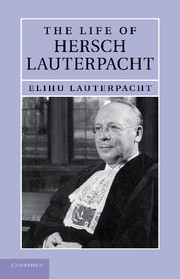Book contents
- Frontmatter
- Contents
- List of plates
- Acknowledgments
- List of abbreviations
- Prologue and introduction
- 1 Background and early years, 1897–1919
- 2 Vienna: research, engagement and marriage, 1919–1923
- 3 England and the London School of Economics, 1923–1937
- 4 Cambridge, 1937–1939: the Whewell Chair
- 5 The war years, Part I: September 1939–January 1941
- 6 The war years, Part II: February 1941–March 1942
- 7 The war years, Part III: April 1942–December 1944
- 8 Human rights
- 9 The years of practice, 1945–1950
- 10 1950–1954
- 11 The International Court of Justice, 1955–1960
- Epilogue: the man
- Appendix 1 The published writings of Sir Hersch Lauterpacht
- Appendix 2 Biographical and academic writings on Sir Hersch Lauterpacht
- Appendix 3 Obituaries of Sir Hersch Lauterpacht
- Appendix 4 Chronology of significant events in the life of Sir Hersch Lauterpacht
- Index
4 - Cambridge, 1937–1939: the Whewell Chair
Published online by Cambridge University Press: 01 June 2011
- Frontmatter
- Contents
- List of plates
- Acknowledgments
- List of abbreviations
- Prologue and introduction
- 1 Background and early years, 1897–1919
- 2 Vienna: research, engagement and marriage, 1919–1923
- 3 England and the London School of Economics, 1923–1937
- 4 Cambridge, 1937–1939: the Whewell Chair
- 5 The war years, Part I: September 1939–January 1941
- 6 The war years, Part II: February 1941–March 1942
- 7 The war years, Part III: April 1942–December 1944
- 8 Human rights
- 9 The years of practice, 1945–1950
- 10 1950–1954
- 11 The International Court of Justice, 1955–1960
- Epilogue: the man
- Appendix 1 The published writings of Sir Hersch Lauterpacht
- Appendix 2 Biographical and academic writings on Sir Hersch Lauterpacht
- Appendix 3 Obituaries of Sir Hersch Lauterpacht
- Appendix 4 Chronology of significant events in the life of Sir Hersch Lauterpacht
- Index
Summary
Towards the end of 1936, McNair was appointed Vice-Chancellor of Liverpool University. He resigned the Whewell Chair of International Law with effect from the end of that year and ceased lecturing at Cambridge at the end of the Michaelmas term, 1936. He had it in mind that Hersch should succeed him and, no doubt to that end, he moved the Faculty to invite Hersch to teach in the Faculty at Cambridge once a week in the Lent Term, 1937, holding a weekly discussion class on Saturday morning for LLB students and a course of six lectures on the ‘Legal Organisation of Peace’ to be delivered at 5.20pm on Friday afternoons. The holding of the weekly discussion class was to be contingent on a sufficient number signing up for it. He was to be paid £70 if both the class and the lectures were held, but only £36 for the lectures alone.
Apart from his election to the ICJ in 1954, the most significant event in Hersch's career was his election in November 1937 to the Whewell Chair of International Law at Cambridge. The Chair had been established in 1867 under the will of William Whewell, Master of Trinity, 1841–66. The Chair became one of the two principal chairs of the subject in England, the other being the Chichele Chair at Oxford held at the time of Hersch's election at Cambridge by Professor J. L. Brierly. The previous holders of the Cambridge Chair had been a diverse group and were not all dedicated international lawyers
- Type
- Chapter
- Information
- The Life of Hersch Lauterpacht , pp. 82 - 99Publisher: Cambridge University PressPrint publication year: 2010



